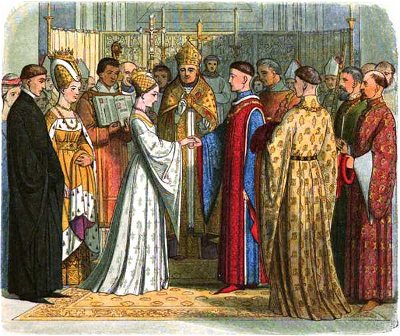13. At whom is Clifford's invective "Hence, heap of wrath, foul indigested lump,/As crooked in thy manners as thy shape!" directed?
From Quiz Henry VI, Part 2
Answer:
Richard Plantagenet, the future Richard III
The scene in which Shakespeare first introduces the prince who, in "Richard III", will grow into one of his most famous and unforgettable dramatic monsters, is particularly rich in vicious verbal abuse and vilification (in fact, it is the scene in which the Yorkists first openly lay claim to the English throne). First Richard's father York, finding that Henry has deceived him, angrily confronts his sovereign:
"False king! Why hast thou broken faith with me,
Knowing how hardly I can brook abuse?
King did I call thee? No, thou art not king,
Not fit to govern and rule multitudes..."
before addressing Queen Margaret in terms still stronger: "O blood-besotted Neopolitan,/Outcast of Naples, England's bloody scourge!"
The two Richards, father and son together, reveal in their very way of speaking that they may well both - unlike the wretched encumbent - have what it takes to be a King of England in those dark times. York remarks, in words which look forward to the later machinations of his son Richard as King, that "My brain, more busy than the labouring spider,/Weaves tedious snares to trap mine enemies". In York's soliloquies, however, the poetry sometimes rises above the swamp of evil that the actions on stage continually present to us. One does not perhaps need to have Yorkshire blood coursing through one's veins in order to enjoy this:
"Then will I raise aloft the milk-white rose,
With whose sweet smell the air shall be perfum'd,
And in my standard bear the arms of York
To grapple with the house of Lancaster;
And force perforce, I'll make him yield the crown,
Whose bookish rule hath pull'd fair England down."
This might be contrasted with Henry's vapid and pathetic "Come, wife, let's in, and learn to govern better,/For yet may England curse my wretched reign."
 Dig into this play, the "pre-quel" to two more Shakespearean histories taking place during the reign of Henry VI, and sort through fact and fiction. I hope the pictures help!
Dig into this play, the "pre-quel" to two more Shakespearean histories taking place during the reign of Henry VI, and sort through fact and fiction. I hope the pictures help!  Dig into this play, the "pre-quel" to two more Shakespearean histories taking place during the reign of Henry VI, and sort through fact and fiction. I hope the pictures help!
Dig into this play, the "pre-quel" to two more Shakespearean histories taking place during the reign of Henry VI, and sort through fact and fiction. I hope the pictures help!  = Top 5% Rated Quiz,
= Top 5% Rated Quiz,
 Top 10% Rated Quiz,
Top 10% Rated Quiz,
 Top 20% Rated Quiz,
Top 20% Rated Quiz,
 A Well Rated Quiz
A Well Rated Quiz